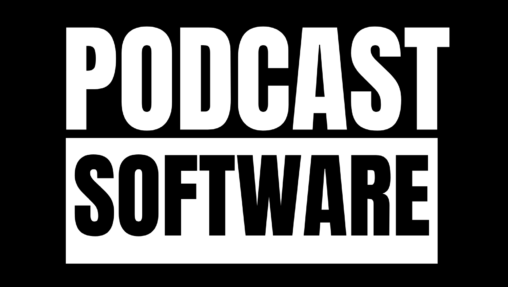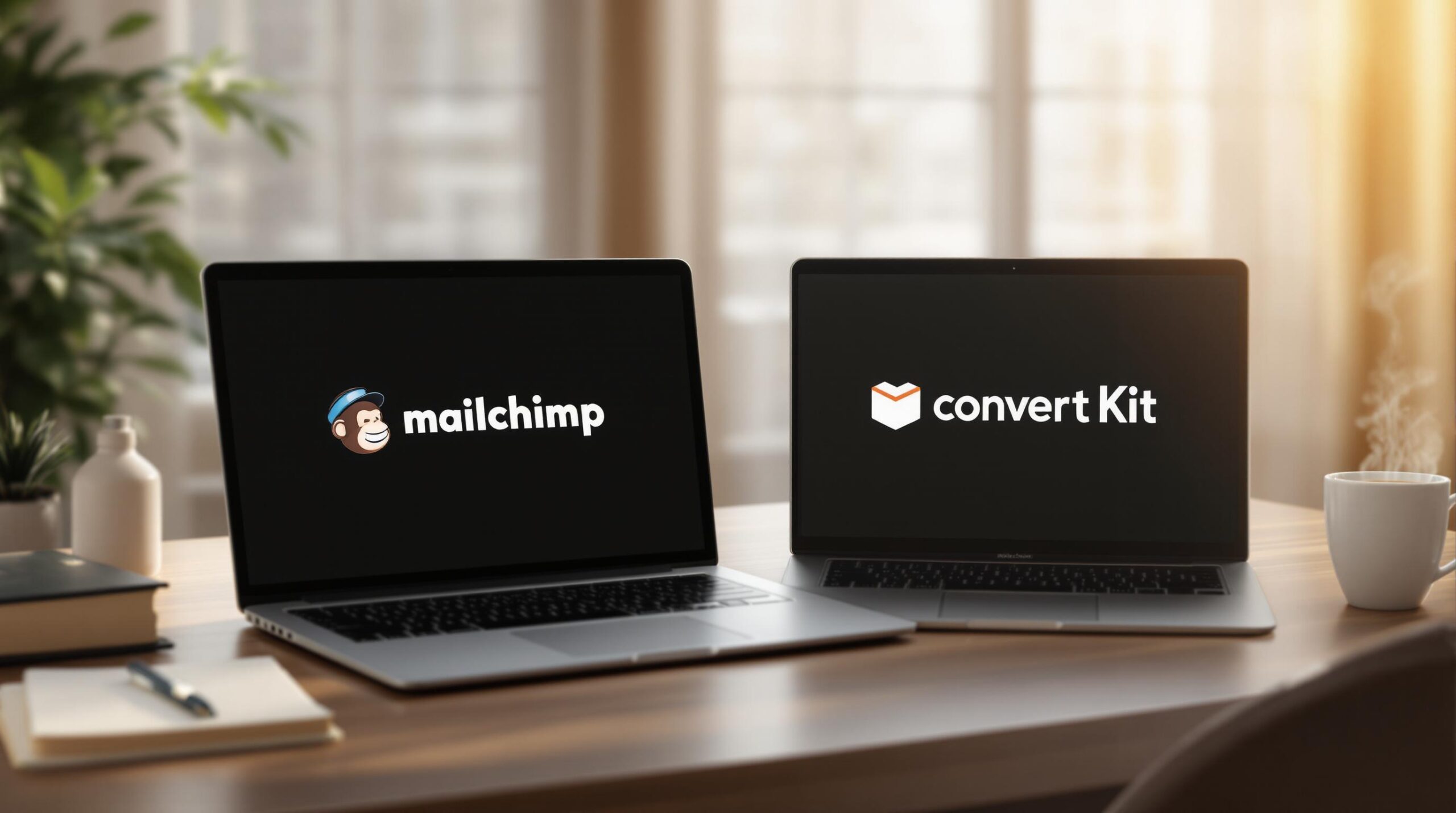Email marketing is essential for podcasters in 2025. It helps grow your audience, keep listeners engaged, and monetize your content. Two popular platforms, Mailchimp and ConvertKit, stand out, but they cater to different needs:
- Mailchimp: Best for beginners and podcasters with larger audiences. Offers a free plan for up to 500 subscribers, advanced design tools, and detailed analytics.
- ConvertKit: Ideal for creators focused on automation and smaller audiences. Free plan supports up to 1,000 subscribers with unlimited emails and landing pages.
Quick Comparison
| Feature | Mailchimp (Free) | ConvertKit (Free) |
|---|---|---|
| Subscriber Limit | 500 | 1,000 |
| Monthly Emails | 1,000 | Unlimited |
| Automation | Basic | Tag-based |
| Design Flexibility | Extensive templates | Simple templates |
| Pricing (Paid) | Starts at $10/month | Starts at $29/month |
Choose Mailchimp for advanced branding and integrations or ConvertKit for focused automation and audience relationships. Keep reading for a detailed breakdown of features, pricing, and recommendations tailored to your podcast’s needs.
Comparing Features of Mailchimp and ConvertKit

ConvertKit Overview
ConvertKit is tailored for content creators, offering a tag-based system instead of traditional subscriber lists. This allows podcasters to segment their audience based on factors like listening habits, engagement, or content preferences [5].
Its automation tools make it easy to set up workflows such as welcome series or delivering bonus content. Using the platform, podcasters can send exclusive episodes to dedicated listeners or create automated email funnels for premium subscribers. The visual builder simplifies the process [5].
ConvertKit also focuses on reliable email delivery by optimizing sender reputation and reducing spam risks. Its clean, straightforward templates are designed to emphasize content, which works well for podcasters [5][6].
Mailchimp Overview
Mailchimp offers more than just email tools – it provides a full suite of marketing features. Its drag-and-drop email builder, paired with customizable templates, helps podcasters design newsletters to showcase episode highlights or sponsorship content [1][5].
The platform delivers detailed analytics, including open rates, click-through rates, and subscriber growth. It also includes a built-in marketing CRM and website builder, making it a strong choice for podcasters looking to grow their online presence [1].
With integrations for various podcasting tools, Mailchimp ensures smooth workflows for creators [5][6].
Pricing Details
Budgeting for email marketing is key for podcasters, so here’s a breakdown of the pricing for both platforms:
| Feature/Plan | ConvertKit Free | ConvertKit Creator | Mailchimp Free |
|---|---|---|---|
| Subscriber Limit | 1,000 | Unlimited | 500 |
| Monthly Email Limit | Unlimited | Unlimited | 1,000 |
| Landing Pages | Unlimited | Unlimited | 1 |
| Email Templates | Basic | Advanced | Limited |
| Automation | Basic | Advanced | Basic |
| Support Period | Unlimited | Priority | 30 days |
| Starting Price | $0/month | $29/month | $0/month |
ConvertKit offers a straightforward pricing model, while Mailchimp adjusts its costs based on subscriber count and additional features [5]. With these details in mind, the next step is to dive into how these platforms handle automation and integrations – essential tools for podcasters.
Automation and Integration Options
Email Automation for Podcasts
ConvertKit uses a tag-based system to make email sequences easier. For example, you can set up triggers based on listener actions like downloading an episode or interacting with your campaigns.
Mailchimp offers an RSS-to-email feature that automatically pulls content from your podcast RSS feed. This makes announcing new episodes a breeze.
Here’s a quick comparison of their automation features for podcasters:
| Automation Feature | ConvertKit | Mailchimp |
|---|---|---|
| RSS-to-Email | Basic Integration | Advanced with Custom Templates |
| Behavioral Triggers | Tag-based System | List-based Segmentation |
| Automated Sequences | Unlimited | Varies by Plan |
While automation helps you save time on communication, integration ensures your email platform connects smoothly with other tools in your podcast workflow.
Integration Capabilities
Mailchimp connects with over 315 apps, including podcast hosts, analytics tools, and social media platforms. Its API also supports custom integrations, making it a great choice if you use multiple tools in your process.
ConvertKit offers integration with 120+ apps, focusing on those most relevant to podcasters.
"ConvertKit’s integration with Zapier can be used to automate tasks between different apps and services, enhancing podcast management" [1].
Key Integration Highlights:
For Mailchimp:
- Direct connections to popular podcast hosting platforms
- Social media scheduling tools
- Advanced analytics platforms
- E-commerce systems for selling merchandise
- Website builders and CMS platforms
For ConvertKit:
- Membership site platforms
- Course delivery systems
- Lead capture tools
- E-commerce solutions
- Landing page builders
These integrations make tasks like syncing listener data or promoting episodes on social media easier. Plus, automated emails tend to perform better – achieving up to 50% higher open rates than manual campaigns [5].
ConvertKit vs MailChimp: A Complete Comparison for Content Creators
sbb-itb-9f49a8d
Selecting the Best Platform for Your Podcast
Picking the right email platform for your podcast boils down to two main factors: your audience size and your marketing strategy. These elements play a big role in how effectively you can grow and keep your listeners engaged.
For Small Podcasters
If you’re just starting out and have fewer than 1,000 subscribers, ConvertKit’s free plan is a solid choice. Its tag-based system makes it easy to organize your audience and send targeted emails.
Here’s what ConvertKit offers for smaller podcasters:
| Feature | What It Does |
|---|---|
| Landing Pages | Create unlimited pages and forms |
| Automation | Simple tagging for audience grouping |
| User Interface | Easy-to-navigate design |
| Email Sending | Send unlimited email broadcasts |
If you’re ready to expand, ConvertKit’s Creator plan starts at $29/month, giving you more tools to support your podcast as it grows [2][4].
For Larger Campaigns
For podcasters with bigger audiences and more advanced needs, Mailchimp is a better fit. While its free plan supports up to 500 subscribers, its paid tiers unlock features designed for serious marketers.
"Mailchimp’s advanced design options and detailed reporting capabilities allow for more sophisticated branding and campaign analysis, which are crucial for larger podcasters aiming to scale their email marketing efforts" [5].
Why Mailchimp works for larger podcasts:
| Feature | How It Helps Larger Podcasts |
|---|---|
| Design Tools | Use professional templates for announcements |
| Analytics | Track and understand your audience deeply |
| Integration | Connect with over 315 apps |
| Testing | A/B test emails to refine strategies |
| Segmentation | Target specific listener groups effectively |
Choosing between ConvertKit and Mailchimp comes down to where your podcast is now and where you want it to go. ConvertKit is simple and beginner-friendly, while Mailchimp offers advanced tools for podcasters looking to scale up their efforts.
Conclusion and Platform Recommendations
Choosing between ConvertKit and Mailchimp comes down to your podcast’s stage and what you’re looking to achieve. Both platforms bring unique strengths to the table, catering to different needs.
| Feature | ConvertKit | Mailchimp | Best For |
|---|---|---|---|
| Free Plan | 1,000 subscribers | 500 subscribers | Beginners |
| Automation | Tag-based system | Pre-made journeys | Targeted Messaging |
| Design | Simple templates | Extensive library | Brand Focus |
| Analytics | Basic reporting | Comprehensive | Data Analysis |
| Learning Curve | Quick | Moderate | Fast Setup |
| Starting Price | $29/month (Creator) | $10/month (Essentials) | Budget Planning |
ConvertKit Recommendations
ConvertKit is a great choice for:
- Podcasters focused on content and simple automation.
- Shows with up to 1,000 subscribers who want access to free features.
- Creators who value building strong audience relationships over complex tools.
- Those who prefer a clean and easy-to-use interface.
Mailchimp Recommendations
Mailchimp is better suited for:
- Podcasts planning to grow beyond 5,000 subscribers.
- Shows that need in-depth analytics to track performance.
- Creators who want more design flexibility and customization options.
- Those integrating with multiple e-commerce platforms.
"ConvertKit’s advanced automation triggers, segmentation, and integration features make it particularly valuable for podcasters focused on building direct relationships with their audience" [1][3].
Whether you’re promoting episodes, connecting with listeners, or monetizing your content, the right email platform can make a big difference. Both ConvertKit and Mailchimp provide powerful tools tailored to different podcasting needs.
For more tips on selecting the right tools for your podcast, check out our FAQs and additional resources below.
Further Resources
If you’re a podcaster aiming to improve your email marketing with tools like Mailchimp or ConvertKit, Podcastsoftware.co offers a handy directory of tools and integrations to help you get started.
Software Integration Tools
| Category | Available Tools | What It Offers |
|---|---|---|
| Hosting Platforms | 10+ providers | Sync subscribers directly |
| Editing Software | 15+ solutions | Repurpose your content |
| Podcast Players | 30+ apps | Analyze audience trends |
| Marketing Tools | Various options | Promote across platforms |
These integrations are just the beginning. There are also advanced tools available to refine your email marketing approach.
Advanced Marketing Tools and Resources
- Audience Analytics: Get insights into listener habits and email performance.
- Content Distribution: Use tools to deliver your content across multiple platforms effortlessly.
Platform-Specific Tools for Mailchimp and ConvertKit
Mailchimp and ConvertKit users have access to features like:
- Template Libraries: Pre-made, customizable email designs.
- Analytics Dashboards: Detailed reporting to track your campaigns.
By tapping into these resources, you can align your email marketing efforts with your podcasting goals.
For more tools and strategies, check out Podcastsoftware.co’s directory. It’s free and regularly updated to meet podcasters’ needs.
FAQs
Is ConvertKit the same as Mailchimp?
No, ConvertKit and Mailchimp are designed for different audiences, offering distinct features:
| Feature | ConvertKit | Mailchimp |
|---|---|---|
| Target Users | Creators | Small-medium businesses |
| Free Plan | 1,000 subs, unlimited pages | 500 subs, 1,000 emails |
| Starting Price | $29/month | Based on subscribers |
| Core Strength | Flexible automation | Reporting & integrations |
What’s best for my podcast size?
Your podcast’s scale plays a big role in choosing the right platform:
- For Small Podcasters: ConvertKit’s free plan supports up to 1,000 subscribers and offers unlimited landing pages and forms [1]. Its tagging system makes managing your audience simple and effective.
- For Larger Shows: Mailchimp provides tools like detailed analytics, a wide range of integrations, and advanced branding options [5].
Can I switch between platforms easily?
Yes, switching is possible since both platforms allow data export and import. However, keep in mind:
- Email sequences must be recreated manually.
- Subscriber tags need to be reorganized.
- Some historical data might not transfer fully.
What are the hidden costs?
Look beyond the subscription fees to account for potential extra costs:
- Design Tools: ConvertKit has basic templates, while Mailchimp may require purchasing premium themes.
- Integration Costs: Third-party tools might need separate subscriptions.
- Support: Premium plans offer priority customer support.
- Storage: Larger media files could incur additional fees.
Which platform better supports monetization?
Both platforms cater to monetization, but they excel in different ways:
-
ConvertKit focuses on creators with features like:
- Selling digital products
- Membership integrations
- Course delivery systems
- Premium content distribution
-
Mailchimp shines in e-commerce and customer-focused tools:
- E-commerce integration
- Advanced purchase tracking
- Customer journey mapping
- Multi-channel campaigns
While ConvertKit offers strong tagging tools and monetization options, Mailchimp stands out for its pre-built automation and broader integrations. The best choice depends on your podcast’s specific needs and goals.

